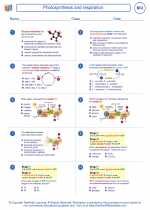Anchorage in Biology
Anchorage in biology refers to the attachment of cells to a substrate, allowing them to maintain their position and resist forces such as movement or tension. This process is crucial for the stability and function of multicellular organisms.
Importance of Anchorage
Anchorage is important for various biological processes, including:
- Cell structure and stability
- Tissue organization and maintenance
- Cell differentiation and specialization
- Cell migration and wound healing
Mechanisms of Anchorage
The anchorage of cells is facilitated by specialized structures and molecules, including:
- Integrins: Cell surface proteins that bind to extracellular matrix components
- Focal adhesions: Multiprotein complexes that link integrins to the cytoskeleton
- Extracellular matrix: The network of proteins and carbohydrates surrounding cells
- Cytoskeleton: Protein filaments within the cell that provide structural support
Study Guide
To understand and study anchorage in biology, consider the following key points:
- Define anchorage and explain its significance in cell biology.
- Describe the mechanisms by which cells anchor to a substrate.
- Discuss the role of integrins, focal adhesions, and the extracellular matrix in anchorage.
- Explain how anchorage influences cell behavior, including migration and differentiation.
- Explore the implications of anchorage in tissue engineering and regenerative medicine.
By mastering the concept of anchorage, you will gain a deeper understanding of cell biology and its relevance to various physiological processes.
.◂Biology Worksheets and Study Guides High School. Photosynthesis and respiration
Worksheet/Answer key Photosynthesis and respiration
Photosynthesis and respiration  Worksheet/Answer key
Worksheet/Answer key Photosynthesis and respiration
Photosynthesis and respiration  Worksheet/Answer key
Worksheet/Answer key Photosynthesis and respiration
Photosynthesis and respiration  Worksheet/Answer key
Worksheet/Answer key Photosynthesis and respiration
Photosynthesis and respiration  Vocabulary/Answer key
Vocabulary/Answer key Photosynthesis and respiration
Photosynthesis and respiration  Vocabulary/Answer key
Vocabulary/Answer key Photosynthesis and respiration
Photosynthesis and respiration 

 Worksheet/Answer key
Worksheet/Answer key
 Worksheet/Answer key
Worksheet/Answer key
 Worksheet/Answer key
Worksheet/Answer key
 Vocabulary/Answer key
Vocabulary/Answer key
 Vocabulary/Answer key
Vocabulary/Answer key

The resources above cover the following skills:
LIFE SCIENCE (NGSS)
From Molecules to Organisms: Structures and Processes
Students who demonstrate understanding can:
Use a model to illustrate how photosynthesis transforms light energy into stored chemical energy.
Ecosystems: Interactions, Energy, and Dynamics
Students who demonstrate understanding can:
Develop a model to illustrate the role of photosynthesis and cellular respiration in the cycling of carbon among the biosphere, atmosphere, hydrosphere, and geosphere.